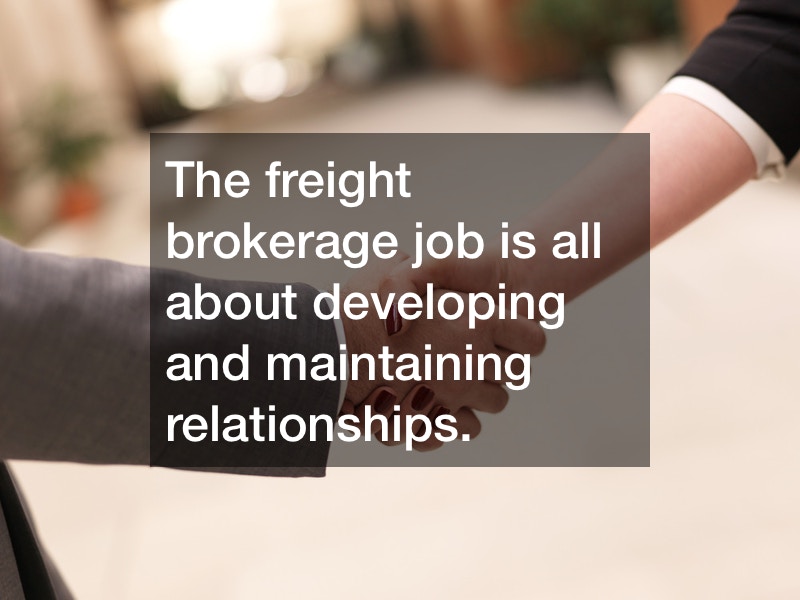
There are several ways you will benefit from working with a freight broker. Unknown to most, the job of a freight broker begins long before your cargo leaves the loading docks. They start by vetting the carrier base to find out if they have the required authority and insurance requirements. They also find out what their areas of expertise are and if their shipping services are reliable. A freight broker will ask these questions, and only after they get satisfactory responses will they assign any type of freight.
 A good freight broker understands how to create and maintain good relations with high-quality carriers. This will enable them to get a cheap freight shipping quote whether you are looking for an international or domestic freight quote. They will also be able to effectively bid on freight shipments. In short, the freight brokerage job is all about developing and maintaining relationships. This enables them to step in and oversee shipments, making certain processes convenient for shippers and saving them a lot of time and money in the process. For instance, all the time that would be spent on delivery quote compare and selecting carriers directly will be spent doing other things since a freight broker will essentially handle everything.
A good freight broker understands how to create and maintain good relations with high-quality carriers. This will enable them to get a cheap freight shipping quote whether you are looking for an international or domestic freight quote. They will also be able to effectively bid on freight shipments. In short, the freight brokerage job is all about developing and maintaining relationships. This enables them to step in and oversee shipments, making certain processes convenient for shippers and saving them a lot of time and money in the process. For instance, all the time that would be spent on delivery quote compare and selecting carriers directly will be spent doing other things since a freight broker will essentially handle everything.

Delivery of cargo is a major factor to any industry, since raw goods and manufactured items must be delivered safety and in a timely manner to various facilities for production, refinement, or most of all, distribution and retail. Creating a finished product is a job shared by several different parties, and a freight broker is the professional who acts as the middleman between a carrier (a truck company, for example) and the shipper who has the items that must be shipped. Some companies, such as MacroPoint and others can provide such freight broker personnel, or else create different brands of broker software to make this job easier, smoother, and more reliable thanks to modern computer technology and communication. What different kinds of loads can shippers use for transporting their goods once a carrier is found? What work do MacroPoint and other companies carry out?
What a Transportation Broker Does
The staff of companies related to MacroPoint and others will work as the in-between for a shipper and a carrier, who effectively negotiates a deal so that shippers can get their cargo delivered and carriers find good-paying clients. The business is huge, so good load broker professionals will be needed to keep this huge industry running. For example, as of 2007, the U.S. Department of Transportation determined that the value of all freight transported was $882, but may increase to $1,337 per ton by the year 2040, and more and more trucks are out there delivering all kinds of cargo. But a freight broker’s main concern is the business of negotiating contracts between shippers and the carriers who can deliver their goods to anywhere in the nation.
According to Trucker Path, a freight broker will not only act as the middleman between a shipper and a carrier, but will also maintain a clear line of communication with the carrier as it moves, and this allows them to update the shipper on the status of the truck and the cargo that it carries. Such brokers may work alone or for businesses dedicated to this work, and some companies will have related jobs such as developing software and other technology for communication between carriers and shippers, such as MacroPoint and others. What is more, this job can prevent a shipper from trying to find a carrier on their own and make a mistake along the way. Many shippers are simply too busy to find a carrier on their own, and even if they do, the staff may not have the experience to find a good carrier and sort them out from the bad ones, and they may not have the skills to properly negotiate a deal.
This is where a freight broker helps out. Not only does the freight broker help set up fair and practical terms for the carrying job, but that broker will also make sure that carrier companies whose trucks are empty find shippers to work with right away, helping everyone have work to do at all times. And even when such a deal is settled, the broker will continue to have input, keeping an open line of communication between the shipper and carrier. This can be helpful if problems arise, such as if a truck gets in a wreck or cannot proceed due to bad weather or road damage. Shippers will want to know right away if there is a complication, and so will the recipients of the cargo. If everyone knows what is going on, then the most can be made of a bad situation rather than mass confusion. And problems or not, the broker will also help everyone know when a delivery has been received successfully. Various smart phone apps and websites can be used by modern freight brokers to communicate with truck companies who are looking for freight to deliver, and this allows brokers to set up a partnership between them and shippers. If a shipper’s cargo has special needs, such as temperature-sensitive food, fragile items, or hazardous materials like liquid nitrogen or industrial waste, specialized trucks will have to be arranged. No ordinary truck driver would want to carry around explosive or corrosive industrial liquids, after all.
